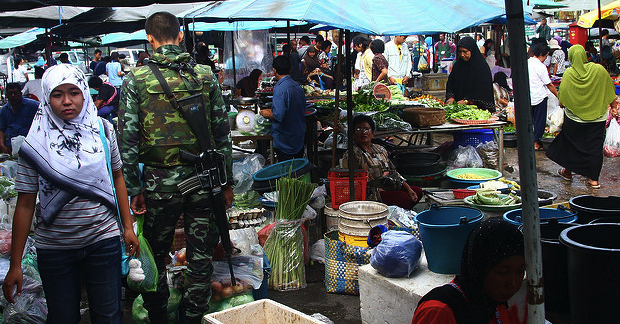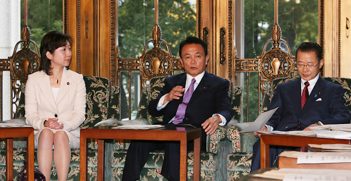Southern Thailand Insurgency Moves North

Bombings across Thailand over the past two months have targeted tourist hotspots, security personnel and even a school. As yet, no group has taken responsibility for the attacks but given a history of similar bombings, Southern-Malay insurgency groups are the obvious suspects. Yet these bombings occurred outside the region typically associated with the southern Thai insurgency and therefore raise a number of questions.
Broadly, there are two groups possibly responsible for the attacks: the pro-Thaksin government red shirts and the Southern-Malay insurgents. The pro-Thaksin red shirts are well known for their past series of violent clashes opposing the military government. Likewise, the southern insurgency operating under the banner of Barisan Revolusi Nasional Melayu Patani (Patani Malay National Revolutionary Front, or BRN) has traditionally used violence within the southern provinces to oppose the military government. Although with similar motives of overthrowing the current military government, there is no chance of the Pro-Thaksin and Malay insurgency working together given the past maltreatment of Malays by former Prime Minister Thaksin Shinawatra’s government which is a significant burden that cannot be easily abandoned by either party. Given the similarities in the bombs used in the 11 and 12 August attacks to those used in Thailand’s Deep South and the ideological motivation for the Patani Malays, evidence points to the Southern-Malay insurgency.
If so, these bombings would represent a shift in strategy as they occured outside the insurgency’s usual operating boundaries. The expansion of the bombings beyond the southern provinces therefore raises concerns within the Thai government as well as observers in the international community. The questions asked by the Human Rights Watch, International Crisis Group and many academics are: Why are civilians and tourists being targeted? What response will the government take towards perpetrators? And, more importantly, what action will the Thai government now take regarding the Patani Malays in Thailand’s southern provinces?
Targeting who?
The various coordinated attacks on the 11 and 12 August have progressed to targeted attacks on tourist spots such as hotels and beaches and key local spots such as schools in early September. The sophistication of the bombs have increased along with the confidence of the attackers. From the experience of the August 2015 attack on the Euwaca shrine, the impact of the bombings will no doubt affect the Thai economy once again.
The coordinated waves of bombings could be seen as a strong reaction to the referendum on a new constitution held in August, or serve as a deep reminder of the August 2015 attack on the Euwaca shrine. Targeting economic hubs and areas hosting ‘sinful’ activities means the choice of the targets aligns with BRN priorities. It has been noted that some of the bombings took place near Patong beach, which is known for its nightlife. As the southern Malay insurgents consider venues that offer sex services “sinful“, these areas become “legitimate” targets for the insurgents. Furthermore, attacks were also positioned near areas where security forces were gathered, such as traffic police outposts and a police station. The bombings of these areas suggest intentional attacks on security forces symbolising power.
It may be that the intention of the attacks was not to hurt civilians, but to use them as a way of sending a message to the Thai government of the insurgency’s desire to fulfil its goal of cultural recognition. Opposition to Thai governments, past and present, stems from the highly centralised Thai state that tightly controls the national narrative and ignores the Malay struggle for cultural recognition. Violent acts such as bombings and arson attacks are becoming more common and prevalent. Taken from the perspective of the insurgency, it can perhaps be seen as a means of expressing continued dissatisfaction with the current Thai military government.
Reaction of the government
As the junta continues to struggle in maintaining control and stability in Thailand, it will be interesting to note the action the government takes to silence voices of opposition from the anti-government groups, particularly the Pro-Thaksin red shirts and the Southern-Malay insurgency. Divisions between the junta and the populations of the Deep South region have been driven deeper by the constitutional referendum. Despite attempts in peace negotiations on the 2 September, there was little progress made between the government and the BRN.
Before the peace talks even began, the result of the referendum decided their fate. The new charter in the constitution will protect and enshrine the practice of Buddhism and further erode the cultural identity of the Muslim population in Thailand. The attempts to balance ‘harmony’ as prescribed by Buddhism within a political system continue to fail, largely at the expense of Thailand’s growing minority. The Thai government’s existing response towards its Malay minority will likely continue, attempting to further degrade the insurgents to ‘low level violence and simple criminal acts’. The government’s denial of insurgents being the perpetrators of the coordinated bombings is an explicit attempt in rejecting the actions taken by them in opposing the government through violence.
Violence and inaction have marked the response of the Thai government for the last 12 years. With little progress in policy or reform actions, the Southern-Malay insurgency has escalated its acts of violence throughout Thailand, highlighted by the fact that these recent bombings occurred outside the traditional southern boundaries. The unwillingness of the Thai government to recognise the cultural difference of the Malays in the southern provinces will continue to fuel the violent engagement between the southern insurgency and the junta. A change in strategy from both parties is required to make peace negotiations a viable solution to the recurring violence.
Tingting Luo is a final year Bachelor of Arts (CDF) student at the University of New South Wales, Canberra. She has studied Southeast Asian politics and culture for the last three years. Her latest trip to the region was to Indonesia under the New Colombo Plan. She is an intern at the AIIA’s National Office.
This article is published under a Creative Commons Licence and may be republished with attribution.





